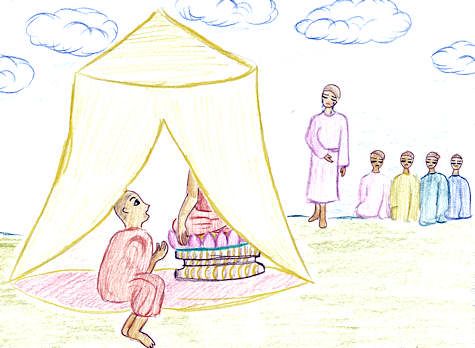
Lady Maha-prajapati and the other women will agree to eight commands.
Drawing by Jinjutha Brahmbhaesajsakul, Sixth College (UCSD), Class of 2011, by permission
Eventually the Buddha and those with him reached the town of Vaishali (Vaiśālī) and stayed in a beautiful mango grove. There they were astonished to discover Lady Maha-prajapati and the other ladies. They had shaved their heads, donned simple cassocks, and set out for Vaishali, just as the Buddha had. Indeed, they looked for all the world as though they were already bhikshunis (bhikṣunī = female bhikṣu) in his movement.
But they were hungry and exhausted, and Lady Maha-prajapati stood outside the entry to the Buddha’s encampment and cried piteously. The Buddha’s follower Ananda heard her sobs, and he went to see what was the matter.
Ananda did his best to calm her down, and when she could finally speak, Lady Maha-prajapati explained that she was brokenhearted because the Buddha wouldn’t let them join his band.
Ananda was much moved, and he confessed that he could not think of any objection to her request. He promised to try to persuade the Buddha to let women leave the family and become bhikshus the same way men could. But again the Buddha refused. Three times Ananda asked, and three times the Buddha refused.
Then Ananda asked the Buddha whether women, if they studied the Law and practiced the teachings, could escape from suffering, as men could. The Buddha agreed that they could.
In that case, Ananda continued, they should be permitted to take that path just like men. And besides, he pointed out, Lady Maha-prajapati was the Buddha’s aunt, and his web nurse, who had raised him. Furthermore, she was a person of great sincerity, as the Buddha himself well knew, and she would not undertake the ascetic life without being fully aware of what she was doing and committed to it.
“Very well, Ananda,” said the Buddha. If Lady Maha-prajapati and the other women will agree to eight commands, then she may do it and we can have bhikshunis.”

So Ananda left the Buddha and relayed the information to Lady Maha-prajapati, who was delighted and agreed to the conditions the Buddha had imposed. And thus she became the first Buddhist bhikshuni, or nun.
Ananda went back to see the Buddha and tell him that his aunt had agreed. But the Buddha prophesied that if women participated, then time when the word of the Buddha would prevail on earth would be shortened. And indeed, because Maha-prajapati became a bhikshuni, the time of the Buddha’s law upon the earth was shortened by five hundred years.